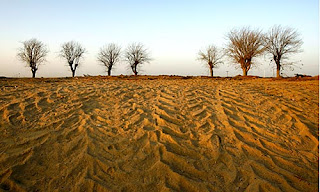It has spawned many names: financial crisis, economic meltdown, depression 2.0, depression 2009, financial armageddon, economic catastrophe, TSHTF... you get the idea. I insist on the label "global depression," because one of the distinguishing features of this financial downward spiral is that it is the first of its kind that will touch each of the 7 billion people on our planet.
Globally, markets are linked together in an intricate web of trade and transaction, so much so that an event in one sector quickly spreads throughout the system. Early on, in September and October of this year (funny how that seems so long ago...way back when I had a retirement nest egg), there were some economists speculating that China, that dynamo of economic growth, might pull markets out of their tailspin--today there are few such optimists left. China's growth has come to a screeching halt: AFP reports that China's growth has slowed to a 20-year low and millions of urban workers are returning to the countryside in one of the largest outmigrations in the nation's history. Even for countries peripheral to global high finance the impact of the economic downturn if being felt. According to IMF reports, the financial crisis is severely impacting the countries of Africa.
The global extent of the coming depression is disconcerting in that social and political instability are sure to increase as markets and prices fall (as it turns out deflation can be more destructive than inflation). Today a full 50% of the world's population lives in urban areas. City dwellers are dependent on the currency for their very survival. As unemployment rises and money becomes scarce, what will these billions of marginally employed people do to live? The future could get very bleak very quickly for many. The depression of the 1930s was bad enough, but at that time the vast majority of the world's population lived an agrarian life where sustenance was not an issue. If you grew crops for your livelihood, your harvest might have fallen in value, but at least you had something to eat. If the
global financial crisis does not turn around very soon there will be first a major shift in migration patterns for the millions who still have an option to move out of the cities (as noted above we are already seeing this in China), and then an unprecedented degree of social disintegration as our swollen cities convulse with violence and unrest.
As our financial system is not localizable, the political unrest due to poverty will not be contained within national borders. It will have effects here as well. Take a walk around downtown Philadelphia, Baltimore, New York City (just beyond the gentrified sections of the city)...the millions living at the margins are in a precarious position. With no savings, no jobs and dependence on a bankrupt state, their options are few. As Bob Marley so aptly put it: "a hungry man is an angry man."
One way to avoid potential social collapse is to support poverty fighting measures in your own backyard. Speculate on worst case scenarios for the next few years. As jobs become scarce and state largess evaporates, how can your community put those most at risk in a less precarious position? I suggest developing or radically expanding community agriculture projects that would at the very least ensure a local supply of fresh food for the most at risk families. If the downturn turns around, and the darkest of outcomes is avoided, you have contributed to the development of a diversified local economy (mixing agriculture with other industries), added to your region's green cred and created jobs to boot!
